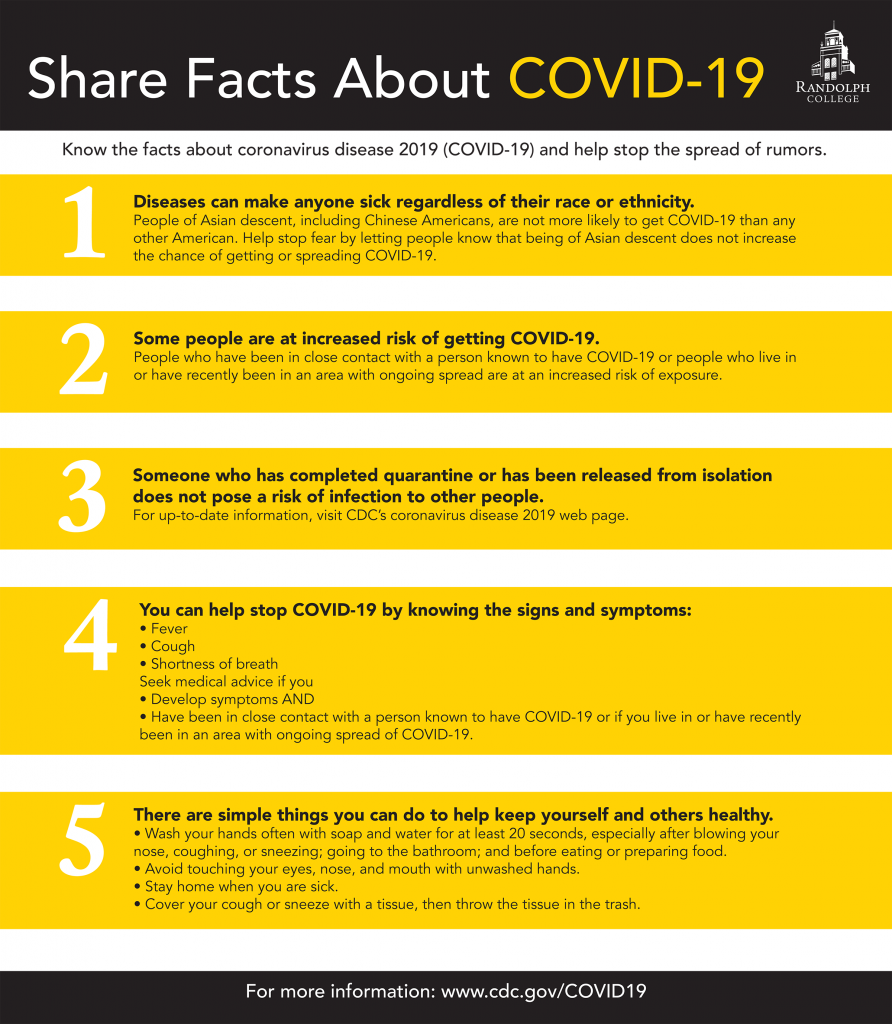Resources
- Randolph College Health Center
- Virginia State Department of Health
- The U.S. Centers for Disease Control and Prevention Coronavirus Resources
- The World Health Organization Coronavirus Resources
Latest Travel Advisories
What is COVID-19?
COVID-19 is a respiratory disease caused by coronavirus, specifically SARS-CoV-2, that is spread mainly between people who are in close contact with one another and through respiratory droplets produced when an infected person coughs, sneezes, or talks. People are most contagious when they are the sickest; however, those who don’t have any noticeable symptoms at all can still pass the virus on to others.
The World Health Organization (WHO) declared this disease a global pandemic in March 2019. The United States has had close to one quarter of the world’s documented cases of COVID-19.
What should I do if I have been around someone who has COVID-19?
If you have been a “close contact” of someone who has tested positive for COVID-19, you should physically separate yourself from others immediately and contact your local healthcare provider or the College’s Health Center to discuss what you should do next. Be prepared to answer health questions, as well as questions about your recent contacts.
*”Close contact”, as defined by the Centers for Disease Control and Prevention (CDC), means being within 6 feet of an infected individual for a total of 15 minutes in a 24-hour period.
Before you go to the College’s Health Center, a doctor’s office, or emergency room, please call ahead and tell them about your recent contacts, travel and/or your symptoms so that they can prepare for your arrival or give you instructions about where to go.
Students who develop symptoms (see below) or have come into contact with an infected individual should contact the Health Center (434-947-8130) as soon as possible – if after hours, contact the Reception and Information Desk (RAID) at 434-947-8000 . Faculty and staff should seek treatment from their primary care providers.
Members of our community who present with symptoms will be treated according to CDC protocols. Up-to-date guidelines and recommendations are here.
What are the symptoms?
The main symptoms include cough, fever, shortness of breath, fatigue, chills, body aches, headache, sore throat, congestion/runny nose, loss of smell or taste, nausea, and diarrhea.
Severe symptoms require immediate medical help and can include trouble breathing, chest pain or pressure, new confusion, inability to fully wake up, and bluish lips or face.
What can I do to protect myself?
The best ways to prevent infection is to get vaccinated and avoid being exposed to the virus that causes COVID-19. There are simple, everyday preventative actions to help prevent the spread of COVID-19, as well as respiratory viruses in general:
- Get vaccinated
- Wear a mask
- Stay 6 feet apart
- Avoid large crowds
- Avoid poorly ventilated spaces
- Avoid touching your eyes, nose, and mouth with unwashed hands.
- Wash your hands often with soap and water for at least 20 seconds. Use an alcohol-based hand sanitizer that contains at least 60% alcohol if soap and water are not available.
If you are sick, to keep from spreading respiratory illness to others, you should:
- Stay home, except to get medical care
- Isolate yourself from other members of your family or residence
- Cover your cough or sneeze with a tissue, throw the tissue in the trash then wash your hands
- Clean and disinfect frequently touched objects and surfaces.
- Get care immediately if you are having severe symptoms, such as trouble breathing or pain in your chest
https://youtu.be/d914EnpU4Fo

